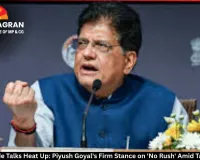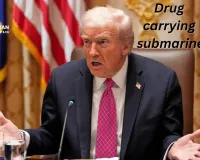Trump-Xi Jinping Meeting in Busan: Breakthrough on Tariffs, Fentanyl and Trade War – What Happened?
Digital Desk
In a landmark moment for global trade and US-China relations, US President Donald Trump and Chinese President Xi Jinping held their first face-to-face meeting in six years at Gimhae Air Base in Busan.
The high-stakes talks, lasting about 1 hour and 45 minutes, focused on resolving the lingering US-China trade war, tariffs, and emerging issues like fentanyl trafficking and rare earth minerals.
As the world watches, this Trump-Xi summit could signal a thaw in bilateral tensions, boosting global markets and easing pressures on American farmers.
The meeting, held on the sidelines of the Asia-Pacific Economic Cooperation (APEC) summit, comes after a tense hiatus since their last encounter in 2019. Trump, fresh into his second term, arrived with optimism, tweeting on Truth Social about the "G2" – a nod to the two economic giants.
Shaking hands under the flags of their nations, Trump quipped, "He's a tough negotiator – that's not good," before patting Xi on the back. Xi, in a conciliatory tone, emphasized that the US and China should be "partners and friends," ready to help each other succeed.
Key Outcomes: Tariffs Trimmed, Soybean Purchases Resume
At the heart of the discussions was the protracted tariff war that has cost billions and disrupted supply chains. Trump announced post-meeting that the two sides agreed to trim US tariffs on Chinese goods in exchange for Beijing's crackdown on the illicit fentanyl trade flooding American streets.
"We've struck deals on tariffs, rare earths, fentanyl, and soybeans," Trump told reporters aboard Air Force One en route to Washington.
China, in turn, committed to resuming large-scale purchases of US soybeans and other farm products "immediately," a lifeline for Midwestern farmers hit hard since Beijing halted imports in retaliation to earlier tariffs.
Rare earth minerals – critical for tech and defense industries – also saw progress. The US resolved a dispute by securing China's commitment to ease export curbs, potentially stabilizing prices and averting shortages.
Trump hailed Xi as a "great leader" with whom the US shares "good relations for a long time," adding that "many important points" were agreed upon, with more to follow.
These developments mark a tactical pause in the US-China rivalry. Analysts note that while the meeting exceeded expectations in brevity and tone, core frictions remain, including technology controls and supply chain security.
Han Shen Lin of The Asia Group described it as "more of a tactical pause than a strategic breakthrough," urging caution amid ongoing disagreements.
Implications for Global Economy and US Farmers
The Busan breakthrough could ripple across the world economy. With the yuan retreating from a near one-year high against the dollar, investors are eyeing renewed trade optimism.
A tariff rollback would not only revive US exports – soybeans alone could inject billions into rural economies – but also foster political and economic softening between the superpowers.
For American farmers, long-suffering from the trade spat, this is a much-needed relief. Agriculture Secretary Brooke Rollins celebrated China's pre-meeting soybean shipments as proof of Trump's "strong dealmaking."
On the geopolitical front, Trump reportedly raised Russia's war in Ukraine "very strongly" with Xi, underscoring the summit's broader scope. Xi's remarks on mutual success-building hint at efforts to lay a "strong foundation" for ties, amid global challenges like supply chain disruptions and inflation.
Challenges Ahead: From Handshakes to Lasting Deals
Despite the friendly optics – leaders exchanging smiles and brief words as they departed – experts warn that rhetoric alone won't suffice. Complex issues like intellectual property theft and market access persist, and the one-year rare earths deal may need annual extensions.
As Trump heads back to Washington, the onus is on implementation. Will this Trump-Xi meeting evolve into a comprehensive trade truce, or remain a symbolic gesture?
The stakes are immense: Success could spur global growth, while failure risks escalation. As updates unfold, markets and policymakers remain glued. For now, Busan's handshake offers hope in a fractured world order.





.jpg)
.jpg)
.jpg)
.jpg)
.jpg)
.jpg)
